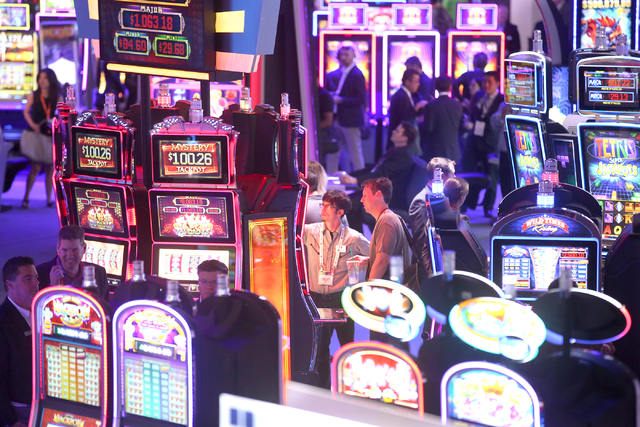Inventor suggests embedding slots with player-friendly images

As gaming companies attempt to unlock the secrets of how to persuade millennials to gamble in casinos, mom-and-pop inventor Darryl Rosenblatt thinks he has the answer — embed slot machines with symbols and images that are important to those individual players.
And the icing on the cake is that his concept also has a built-in marketing component that encourages a player’s friends to participate in those games from afar.
Rosenblatt, of Davisburg, Michigan, is convinced he has decoded the mystery of the millennials and has worked for months to deliver a slot machine interface called Real Reels. Rosenblatt’s Scrappy Elegant Gaming developed the Personalized Electronic Gaming Experience that led to the filing of a patent for Real Reels in June 2014.
With help from Las Vegas patent attorney Rich Newman, Rosenblatt received a patent in November and is now ready to take his invention to slot machine manufacturers to license and incorporate into their devices.
Here’s how it works: A player locates a Real Reels-enabled slot machine in a casino on whatever popular game they choose.
Rosenblatt said it could be any popular game with a following that has symbols along a digital reel, such as IGT’s Cleopatra or Aristocrat’s Buffalo.
Through a smartphone app, the player connects wirelessly to the machine through Bluetooth.
Once connected, the player can select images from that phone — pictures of a spouse or significant other, a pet or a place — onto the slot machine. The machine will also take sound so that it’s customized with the player’s favorite music as well.
Then … they play.
Rosenblatt explained the manufacturers already have stables of successful game titles they put in different forms in slot machines. Sometimes, they’ll pay thousands of dollars for licensing to popular televisions shows, movies or celebrity images to put a different spin on a game that has been proven, reviewed and licensed by regulators worldwide.
“I’ll give you an example,” Rosenblatt said in a recent telephone interview. “Aristocrat will put out a game like Buffalo. They came out with it in 2009 and it was immediately recognized as perhaps one of the most successful slot titles they’d ever come up with.
“The wonderful thing that we have with this technology is branding no longer becomes an issue because what’s important to people is what’s typically found on their phones.”
Rosenblatt believes that by placing imagery, content and music that is meaningful to the millennial player will lead to a resurgence in slot play and attract a demographic that traditionally stays away from the casino floor.
One of the bonuses of Real Reels is what occurs on a slot machine’s bonus round.
When a bonus round occurs, the game will harvest contacts from the player’s Facebook and Instagram accounts and will send a text message to friends on a contact list. The text will note the name of the player, the machine and the casino and encourage those friends to download an app that will enable them to play separate social games that will help the player make decisions on the bonus round.
“It’s kind of like ‘phone a friend’ in ‘Who Wants to Be a Millionaire?’ on TV,” Rosenblatt said. “They’re not actually playing the game, but they’ll be able to help the player in the casino make decisions.”
Rosenblatt’s concept presents all sorts of regulatory gray areas. A.G. Burnett, chairman of the state Gaming Control Board, didn’t address Real Reels specifically in case it ever comes before his board, but he said some of the product’s concepts beg legitimate questions. Could the interface between the phone and the slot machine provide a means to manipulate play? Are those friends playing social games from afar participating in a form of online gambling?
Rosenblatt says the Bluetooth connection won’t touch game play and payouts and the games played by friends don’t involve any wagering.
“If I were him, I’d be sure to be represented by counsel,” Burnett said.
And that’s where Newman comes in.
He moved to Las Vegas in 2005 and once worked for Shuffle Master, a company that through a series of corporate acquisitions is now a part of Scientific Games. Because Newman has represented both sides in the manufacturing realm and specializes in patent work he was the perfect choice for Rosenblatt.
Newman said he doesn’t believe Rosenblatt would have to be licensed as a gaming supplier affiliate since his product wouldn’t change the machine’s function and that his best bet is to strike licensing agreements with manufacturers interested in the product. He’s optimistic that he’ll have some cordial negotiations with companies to bring the product to market.
Rosenblatt recently felt validated in his confidence in the product because he learned that Aristocrat filed a patent application that was similar to his system. That told him he’s onto something.
But a bigger question remains: Is this something that a slot player wants and will it compel a group of people that traditionally stays away from casinos to begin playing?
Only time will tell.
Contact Richard N. Velotta at rvelotta@reviewjournal.com or 702-477-3893. Follow @RickVelotta on Twitter.